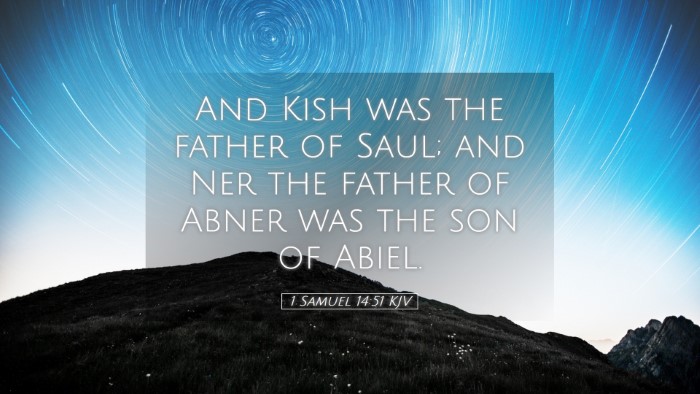Commentary on 1 Samuel 14:51
1 Samuel 14:51 states: "And Kish was the father of Saul; and Ner the father of Abner was the son of Abiel." This verse, simple in its statement, asserts significant genealogical details that reveal much about leadership, relationships, and the historical context of Israel during this period. Below, we unpack insights drawn from revered public domain commentaries.
Genealogical Analysis
Matthew Henry emphasizes the importance of genealogical records in the Old Testament. These records not only provide a lineage but also underscore the significance of family heritage in God’s covenant community. The mention of Kish as Saul's father highlights the familial ties leading to the establishment of kingship in Israel. Henry notes that Saul's lineage connects him to significant figures of the tribe of Benjamin, which is pivotal in understanding the early monarchy in Israel.
The Role of Abner
Albert Barnes elaborates on the character of Abner, who is introduced in this verse. As the son of Ner and the cousin of Saul, Abner plays a crucial role as a military leader and strategist for Saul. Barnes points out that Abner’s relationship with Saul reflects the complex dynamics of power and loyalty during Saul's reign. His position as a commander serves to illustrate the political landscape of Israel, wherein family relations often determined alliances and military leadership.
Abner's Influence
The presence of Abner is notable not only for his support of Saul but also for his pivotal role later in the conflict surrounding David's emergence as king. As Barnes indicates, understanding Abner's lineage emphasizes the intertwining of familial and political alliances that characterized the leadership struggles of this era.
Theological Implications
Adam Clarke provides a theological reflection on the significance of genealogies in scriptural texts. He highlights that these verses, often overlooked, are critical for understanding God's covenantal promises, as they trace His chosen leaders’ lineage. Clarke underscores that the establishment of Saul's kingship is part of God's sovereign plan for Israel, and that every individual mentioned in this genealogy plays a role in that divine purpose. The precise naming of these individuals signifies God’s ordained plan unfolding in history.
Clarke further suggests that these genealogical records encourage believers to reflect on their own spiritual heritage and divine calling. By observing the faithfulness of God through generations, pastors and theologians are reminded of the continuity of God's plan, which transcends individual actions and decisions.
Lessons for Today
- Evaluating Leadership: Saul's lineage prompts a reflection on the qualities that define a leader. It is essential for contemporary leaders to reflect on their integrity, commitment to God's service, and the legacy they create.
- Understanding Familial Influence: Just as Saul and Abner's relationships shaped their leadership journeys, leaders today must recognize the impact of family and close relationships on their service and integrity.
- God’s Sovereignty in History: The genealogies remind readers of God's sovereign hand guiding history. Understanding this can provide comfort and assurance of God's guidance in today's uncertain times.
Conclusion
1 Samuel 14:51 serves as a vital reminder of the interconnectedness of genealogies, leadership, and divine guidance in biblical narratives. By drawing from the insights of Matthew Henry, Albert Barnes, and Adam Clarke, pastors, students, theologians, and Bible scholars can deepen their understanding of this verse. It encourages a holistic view of Scripture where genealogical details contribute to a more profound understanding of God’s plan through history.
As we delve into these reflections, may we be inspired to acknowledge our spiritual heritage, evaluate our leadership with humility and integrity, and trust in God’s sovereign plan for our lives today.


